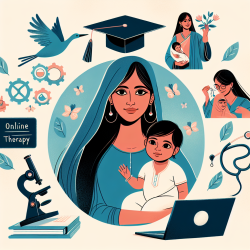Introduction
As a speech-language pathologist, understanding the multifaceted factors influencing a child's well-being is crucial. A recent study titled "Low social acceptance among peers increases the risk of persistent musculoskeletal pain in adolescents. Prospective data from the Fit Futures Study" sheds light on an often-overlooked aspect: the role of social acceptance in adolescent health. This blog explores how practitioners can leverage these findings to improve outcomes for children.
The Study's Findings
The research conducted by Jahre et al. (2022) highlights a significant correlation between low social acceptance among peers and the development of persistent musculoskeletal (MSK) pain in adolescents. The study utilized longitudinal data from the Norwegian Fit Futures Study, involving 775 participants. It found that adolescents with low social acceptance had a higher likelihood of experiencing persistent MSK pain two years later. The odds ratio (OR) was 1.8, indicating a substantial risk increase.
Implications for Practitioners
These findings suggest that social factors, such as peer acceptance, play a critical role in adolescent health. As practitioners, it's essential to consider these social dimensions when assessing and planning interventions for adolescents. Here are some strategies to incorporate these insights into practice:
- Holistic Assessment: Incorporate questions about social interactions and peer acceptance in assessments to identify at-risk adolescents early.
- Interdisciplinary Collaboration: Work closely with educators and psychologists to create supportive environments that enhance peer acceptance.
- Targeted Interventions: Develop programs that focus on building social skills and resilience among adolescents, potentially reducing the risk of persistent MSK pain.
Encouraging Further Research
While this study provides valuable insights, it also opens avenues for further research. Practitioners are encouraged to explore:
- Longitudinal Studies: Conduct studies that follow adolescents over longer periods to understand the long-term effects of social acceptance on MSK pain.
- Intervention Efficacy: Evaluate the effectiveness of interventions aimed at improving social acceptance and their impact on reducing MSK pain.
- Broader Social Factors: Investigate other social factors, such as family dynamics and community support, that may influence adolescent health.
Conclusion
Understanding the link between social acceptance and musculoskeletal pain in adolescents is crucial for developing effective interventions. By incorporating social factors into assessments and interventions, practitioners can better support adolescents in achieving optimal health outcomes.
To read the original research paper, please follow this link: Low social acceptance among peers increases the risk of persistent musculoskeletal pain in adolescents. Prospective data from the Fit Futures Study.










